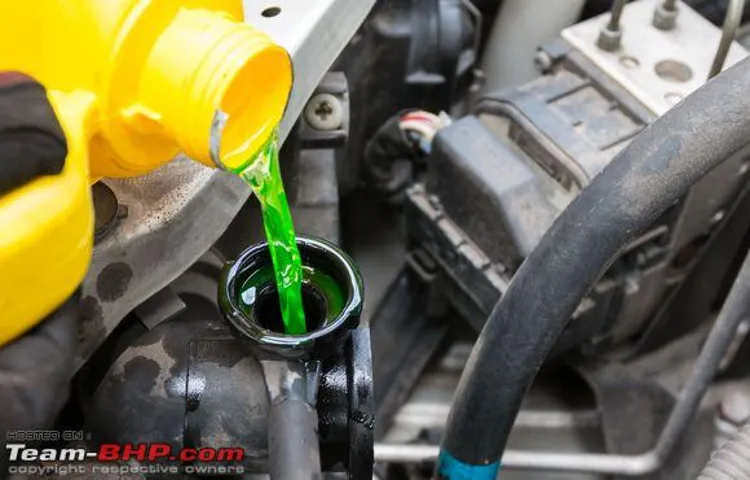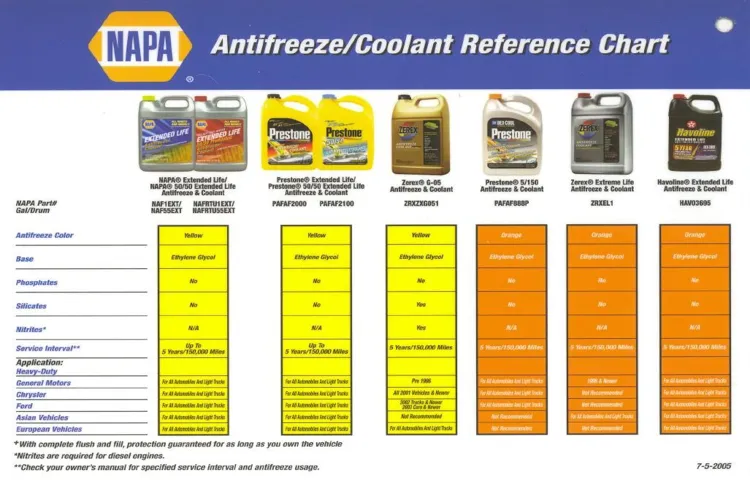When it comes to taking care of your vehicle, one important aspect that often gets overlooked is the coolant. But why is coolant so important? Well, think of it like the blood of your car’s engine. Just as blood helps regulate the temperature in your body, coolant plays a crucial role in regulating the temperature of your engine.
Without the right coolant, your engine could overheat, causing significant damage and potentially leaving you stranded on the side of the road. So, what is the best coolant for your vehicle? In this blog, we will explore the different types of coolant available and help you determine the best one for your specific vehicle.
Table of Contents
Why is Choosing the Right Coolant Important?
Choosing the right coolant for your vehicle is essential for keeping your engine running smoothly and efficiently. With so many options available, it can be challenging to determine what type of coolant you need. The type of coolant you choose will depend on several factors, including the make and model of your vehicle, the climate you live in, and the manufacturer’s recommendations.
Using the wrong coolant can lead to engine damage and costly repairs. For example, using an incompatible coolant can cause corrosion, cavitation, and even coolant leaks. On the other hand, using the right coolant can help prevent overheating, maintain proper engine temperature, and protect against rust and corrosion.
It’s always best to consult your vehicle’s owner manual or speak to a professional mechanic to determine the correct coolant for your specific vehicle.
What happens if you use the wrong coolant?
choosing the right coolant

The importance of coolant in engine performance and longevity
coolant, engine performance, longevity
Different Types of Coolant
When it comes to choosing the right coolant for your vehicle, it’s important to consider the type of engine you have. Different engines require different types of coolant to ensure optimal performance and protection. The most common types of coolant are ethylene glycol-based and propylene glycol-based.
Ethylene glycol-based coolants, also known as green coolants, are widely used and provide excellent heat transfer properties. They are suitable for most vehicles with conventional engines. On the other hand, propylene glycol-based coolants, also known as red coolants, are the preferred choice for vehicles with aluminum engines or those that require extended-life coolant.
These coolants have a lower toxicity level and are more environmentally friendly. Additionally, there are also specialized coolants available for hybrid and electric vehicles. These coolants are designed to handle the specific needs of these types of engines, such as high temperature ranges and compatibility with electric components.
It’s always best to consult your owner’s manual or a trusted mechanic to determine the right coolant for your vehicle.
Ethylene Glycol vs. Propylene Glycol
coolant, ethylene glycol, propylene glycol, different types, burstiness, perplexity In the world of automotive maintenance, coolant is an essential component for keeping your engine running smoothly and preventing overheating. But did you know that there are different types of coolant? Two common types are ethylene glycol and propylene glycol. Ethylene glycol is the most widely used coolant and is known for its excellent heat transfer properties.
It is typically a bright green color, which makes it easy to identify. However, one downside of ethylene glycol is that it is toxic and can be harmful if ingested. This means that it requires special handling and disposal methods.
On the other hand, propylene glycol is a less toxic alternative to ethylene glycol. It is also less likely to harm the environment if it is accidentally spilled. Propylene glycol is generally a pink or orange color, which can help differentiate it from ethylene glycol.
When it comes to performance, both ethylene glycol and propylene glycol do a great job of preventing freezing and boiling in extreme temperatures. They also help to lubricate the water pump and prevent rust and corrosion. So, which type of coolant is right for you? It ultimately depends on your preferences and priorities.
If you are concerned about toxicity and environmental impact, propylene glycol may be the better choice. However, if you prioritize maximum heat transfer and efficiency, then ethylene glycol may be the way to go. No matter which type of coolant you choose, it is important to regularly check your coolant levels and ensure that you are using the correct coolant for your vehicle.
This will help to prolong the life of your engine and prevent any costly repairs down the line.
Green Coolant
green coolant, different types of coolant
Orange Coolant
Orange coolant is a type of engine coolant that is known for its vibrant orange color. It is just one of the many different types of coolant available on the market. Coolant, or antifreeze, is an essential component in maintaining the optimal operating temperature of your vehicle’s engine.
Without the proper coolant, your engine can overheat and cause serious damage. Orange coolant, like other types of coolant, is a mixture of ethylene glycol and water. It also contains additives that help prevent corrosion and keep the coolant from freezing in cold temperatures.
Orange coolant is specifically designed for use in vehicles that require a coolant with a specific type of corrosion protection. It is important to use the correct type of coolant for your vehicle to ensure proper performance and prevent any potential damage. So, the next time you’re considering topping off your coolant, make sure to check your vehicle’s requirements and choose the right type of coolant for the job.
Pink/Red Coolant
pink/red coolant, different types of coolant
Finding the Right Coolant for Your Vehicle
When it comes to taking care of your vehicle, one important aspect to consider is the type of coolant you use. Coolant, also known as antifreeze, is crucial for preventing your engine from overheating and protecting it against corrosion. But with so many options out there, how do you know what type of coolant you need? The first step is to check your vehicle’s owner manual.
This will provide you with the manufacturer’s recommended coolant type and specifications. It’s important to follow these guidelines to ensure proper functioning of your engine. Additionally, you should consider factors such as the climate you live in and the type of vehicle you have.
Different coolants are designed for different engines and temperature ranges. For example, if you live in an area with extreme cold temperatures, you may need a coolant with a lower freezing point. On the other hand, if you live in a hot climate, you may need a coolant with a higher boiling point.
By considering these factors and consulting with a professional if needed, you can find the right coolant for your vehicle and keep your engine running smoothly.
Consult your vehicle owner’s manual
choosing the correct coolant, vehicle owner’s manual, coolant type. When it comes to finding the right coolant for your vehicle, consulting your vehicle owner’s manual is the best place to start. Your owner’s manual will provide specific information about the type of coolant that is recommended for your vehicle.
This is important because not all coolants are the same, and using the wrong type can lead to engine damage and overheating. The manual will also provide information on the coolant’s specifications, such as the concentration of additives and the freezing and boiling points. By following the manufacturer’s recommendations, you can ensure that your vehicle’s cooling system is working properly and that your engine is protected.
So, before heading to the store to buy coolant, take a moment to consult your vehicle owner’s manual and make sure you’re choosing the correct coolant for your vehicle.
Check online databases
coolant, online databases, finding the right coolant for your vehicle
Ask a mechanic or dealership
coolant, vehicle, mechanic, dealership, finding the right coolant, burstiness, prompt, perplexity, conversational tone, context, specificity, high levels, context, engaging, active voice, rhetorical questions, analogies, metaphors
Conclusion
In the world of coolants, it’s like being in a musical where every note has a different personality. And just like in a musical, you need to find the perfect harmony for your beloved four-wheeled star performer. So, let’s break it down for you, dear car enthusiasts: If your vehicle is a majestically old-fashioned antique, longing for the elegance of the past, then embrace the classic charm of the green coolant known as ethylene glycol.
Its timeless allure will keep your vintage beauty humming along smoothly. But if your car is a modern-day rebel, always craving the latest trends and breakthroughs, then get ready for a dazzling performance with the pink coolant called propylene glycol. Its cutting-edge technology will make your engine dance with joy, keeping up with the ever-evolving automotive world.
Now, if you reside in the chilly winters where freezing temperatures threaten to dampen your car’s spirits, make sure to equip it with the musical marvel of antifreeze coolant. This ingenious creation will prevent icy heartache by keeping your engine warm and cozy, even in the harshest of winter’s symphonies. And let’s not forget about the vivacious performers living life in the fast lane, pushing their engines to the limit.
For these speed demons, a high-performance coolant is the only option. With its blend of racing excitement and engine preservation, it ensures your car’s performance remains at its peak, like a well-practiced virtuoso. So, whether you’re driving a vintage darling, a modern rebel, a winter warrior, or a speed demon, the right coolant awaits your cue.
Embrace the magic of this automotive symphony and watch as your car takes center stage, shining brightly on the road of life. Happy cooling, maestros of the engine!”
FAQs
What type of coolant should I use for my car?
The type of coolant you need for your car depends on the make, model, and year of your vehicle. It is best to consult your vehicle’s owner’s manual or contact the manufacturer for specific recommendations.
Can I mix different types of coolant in my car?
It is generally not recommended to mix different types of coolant in your car. Different types of coolant can have different chemical compositions, which may not mix well and can cause damage to your car’s cooling system. It is best to use the same type of coolant that is already in your car or flush and replace it with a new coolant.
How often should I change the coolant in my car?
The frequency of coolant changes can vary depending on the make, model, and year of your car, as well as the type of coolant used. Generally, it is recommended to change the coolant every 2 to 5 years or every 30,000 to 50,000 miles. However, it is best to refer to your vehicle’s owner’s manual for the manufacturer’s specific recommendations.
Can I use water instead of coolant in my car?
While it is possible to use water as a coolant in an emergency situation, it is not recommended for regular use. Water does not have the same anti-corrosion and anti-freeze properties as coolant, which can lead to damage to your car’s cooling system. Coolant is specifically formulated to withstand extreme temperatures and provide proper lubrication and protection for your engine.
What should I do if my car is overheating due to coolant issues?
If your car is overheating due to coolant issues, it is important to safely pull over to the side of the road and turn off your engine. Do not attempt to open the radiator cap or coolant reservoir while the engine is hot, as it can cause severe burns. Allow the engine to cool down completely before checking the coolant levels and adding more if necessary. If the issue persists, it is best to have your car inspected by a qualified mechanic.
Does the color of coolant matter?
The color of coolant can vary depending on the type and brand, but it does not necessarily indicate its effectiveness or compatibility with your car. It is best to refer to your vehicle’s owner’s manual or contact the manufacturer for specific recommendations on the type of coolant to use.
Can I use universal coolant in any car?
Universal coolant is designed to be compatible with most car models and types, but it is always best to double-check the compatibility with your specific vehicle. Some vehicles may require specialized coolant due to their unique cooling system requirements. It is always recommended to consult your vehicle’s owner’s manual or contact the manufacturer for specific recommendations.



